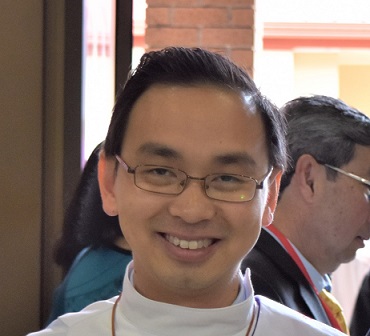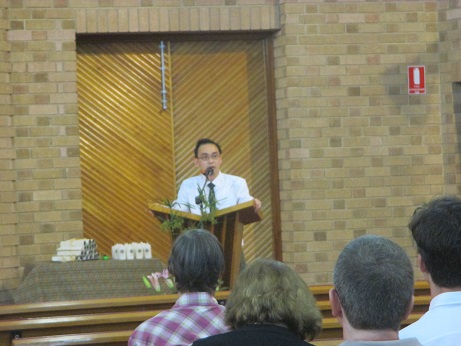KHOI NGUYEN MSC, PRE-NOVITIATE DIRECTOR, CUSKELLY HOUSE, BLACKBURN.
As he explains, Khoi recently did a brief course in Chicago and sent a copy of his paper. It is reproduced here for those who would like to read it and see something of what is required for MSC formation in our contemporary world.
INTEGRATING OUR SEXUALITY
Khoi Nguyen msc
In June 2018, I was sent to Chicago to study at the Institute For Sexuality Studies (connected with Catholic Theological Union). As the result of this one month in-depth course, the students (who were mostly formators) were asked to write an integration paper in which we synthesise what we had learned, personally and professionally. This article is a result of my paper with some modification to make it more suitable and relevant for readers.

Let me begin this article by one of the most fundamental affirmations and truths about human sexuality. To be human is to be sexual. To be sexual is to be relational – with self, others and God. Kevin McClone, my professor at the Institute of Sexuality Studies, Chicago, used to say: “There is no spirituality without sexuality.”
Our sexuality is essential, vital, and fundamental to our being as human and spiritual. We cannot talk about humanity without touching on our sexuality. We cannot live fully a human life without living wholeheartedly our sexuality. This is because our humanity is all about relating, loving and being loved, caring for others with our affection, emotion, physical presence, thoughtful gesture and ultimately unconditional love, and longing for the same (or similar) care from others, especially those we love. All of this is fundamentally founded upon our sexuality – our awareness, acceptance, integration and channelling of our sexual energy, desires and feelings.

Kevin McClone, CTU
Sexual feelings, desires and longings are indications of God’s Spirit working in us. It is a grace of God urging us to connect, to commune, to unite. Firstly, we are called to touch into who we are, to connect with ourselves. Regardless of our sexual orientation, gender and sexual attraction, we are created in God’s image and likeness. This means that we are an image of love, and we are free to love and to accept love that is offered us. This is true for those who are women or men as well as those who are lesbian, gay, bisexual, transgender or intersex. If one should not be discriminated by the variation of their skin colour, race or culture, one also should not be looked down or condemned because of their sexual variation. The identifications of homosexual acts and homosexuality as ‘intrinsically disorder’ or ‘intrinsic moral evil’ are more and more understood in psychology and sciences to be misunderstandings or myths. I think the Church needs to listen to the LGBTI people with a more open mind and heart, with a compassion that of Jesus than with a claimed institutional authority that filters our ears and closes our hearts. As Brian McNaught, an American corporate coach and author on LGBT issues, said: “No one would choose to be gay so to be rejected, discriminated and ostracised by his family, friends and community.” The LGBTIQ issues in religious life today are wake up calls for me and those who are heterosexual or straight from our lack of vigilance and awareness of the sufferings of our brothers and sisters; some who are very close to us – our community members, our families, our close friends, our parishioners, or our young people.
Our sexuality is not merely something we are experiencing just now but it is a life or a self that has been building up, growing, developing and maturing over time. In other words, our sexuality has a history we need to look back on, reflect and accept. Only in doing this, we become more aware of how we are with our sexuality now, how much we accept or feel at home with it, how we deal with our current sexual desires, feelings and longings, how we react or respond to our today’s relating with others, and how we pray and see where God is in our sexual and relational realm.

Looking back on my psychosexual history, emotional life was poor and at times impoverished deeply. This led me to a fragmentation in my sexual desire and gratification, a disconnection between emotional intimacy and physical pleasure, a separation between human body and emotional effect. Emotional need and intimacy I lacked when growing up became driving forces for me to involve in many romantic relationships so to indulge what I missed. Of course I never felt satisfied and always restless in heart. I considered emotional disconnection as a lack of love, and emotional realm was a sole, decisive factor in my intimate relationship with others, and ultimately with God. When I don’t feel ‘good’ in prayer, when prayer doesn’t feel wonderful or fruitful, I tend to perceive it as a lack of being loved by God. When bad things happen to me, when sickness strikes, it means that God is unhappy with me. I fail to see a God of Jesus, a God who endures with me through pain and suffering, through the ups and downs of life, through my successes and failures, through my weaknesses and glories. Love is much more than how I feel emotionally.
Having said that, it doesn’t mean that emotion means nothing. Over the years, I have grown and learned more deeply and consciously about my emotional life. Without this, my sexuality will go unchecked – repressed, acting out or both. Tending to my emotional life is as important as tending to my physical body and health, my intellectual development, as well as my spiritual journey. In fact that the more I tend to my emotional life, the better I am aware of and growing in other aspects of myself. One thing I realise is that one aspect of human being cannot be replaced or substituted by others. If my emotional life is going wild, I need to attend to it. I cannot use intellectual life, e.g. my studies, to suppress it for too long. We cannot excuse ourselves from dealing with our emotions and pains by sublimating them to pastoral responsibility. Sooner or later, we will need to attend to it – being aware, accepting, expressing appropriately and integrating them, at times (or many times) with the help of others. If sexuality is the energy for connection, we cannot deal with it alone. We need the graces of God and others whom we trust to help us integrate and thrive with our sexuality.

Our sexuality is manifested in ways we are interacting with others. Interacting with others is how to seek intimacy at the circumstances given us. We ourselves need our own personal intimacy – affectional intimacy, physical intimacy, and spiritual intimacy. We also have ministerial intimacy, crisis intimacy, communication intimacy, intellectual intimacy, or community intimacy. All these intimacies are fundamental to our identity and integration as human being. Intimacy is a human constant and permanent need. Without this need, there is no sexual desire and energy flowing through human bodies.
Having said all these points, I now turn to pay attention to their applications in formation for men in community. A community and environment of acceptance and sensitivity needs to be built in terms of human sexuality. The men entering initial formation need to feel safe and accepted talking, discussing and revealing their sexuality – feelings, fantasies, longings, experiences. This needs to happen in formation discussion, formation education and relationships between formators and students, students and other members of community. The men in formation need to have spiritual directors, supervisors and/or counsellors who accompany them individually according to their needs and who can accept and deal with issues of human sexuality in positive and meaningful ways. Avoiding giving the students mixed messages or conflicting messages about sexual issues and sexuality. Friendship and interaction with others beyond formation and religious community are encouraged with a humility that community/religious life is not always providing enough intimacy that one needs.
Lastly, being informed, educated, self-aware, self-attentive and self-responsible in our sexuality are not merely applied for students in formation, but also for formators who are called to be models in this area. One of my respected formators used to say: “Don’t teach anyone to do what you yourself cannot do. And even if you can do what you are supposed to do, don’t judge but be compassionate.”

